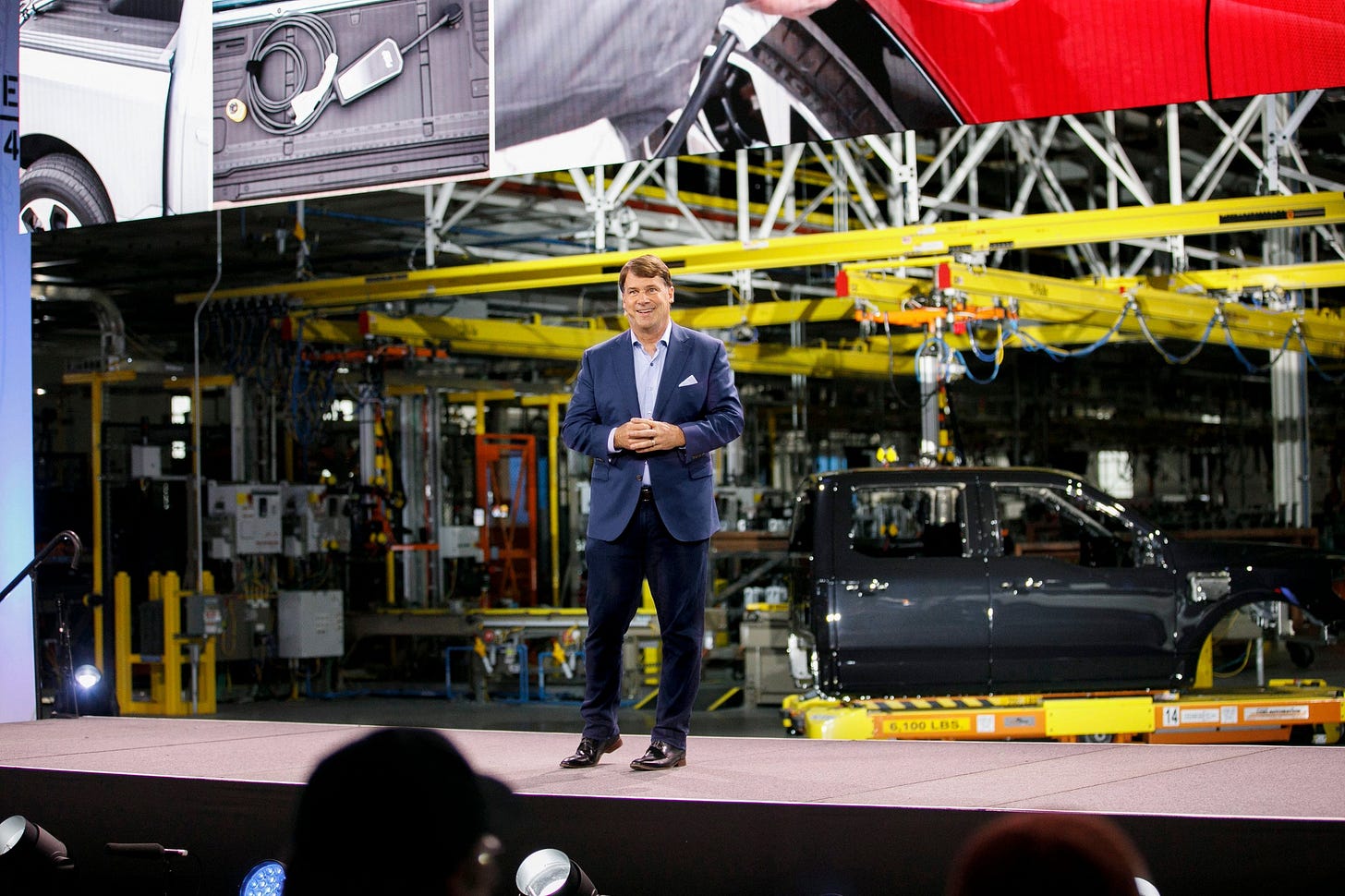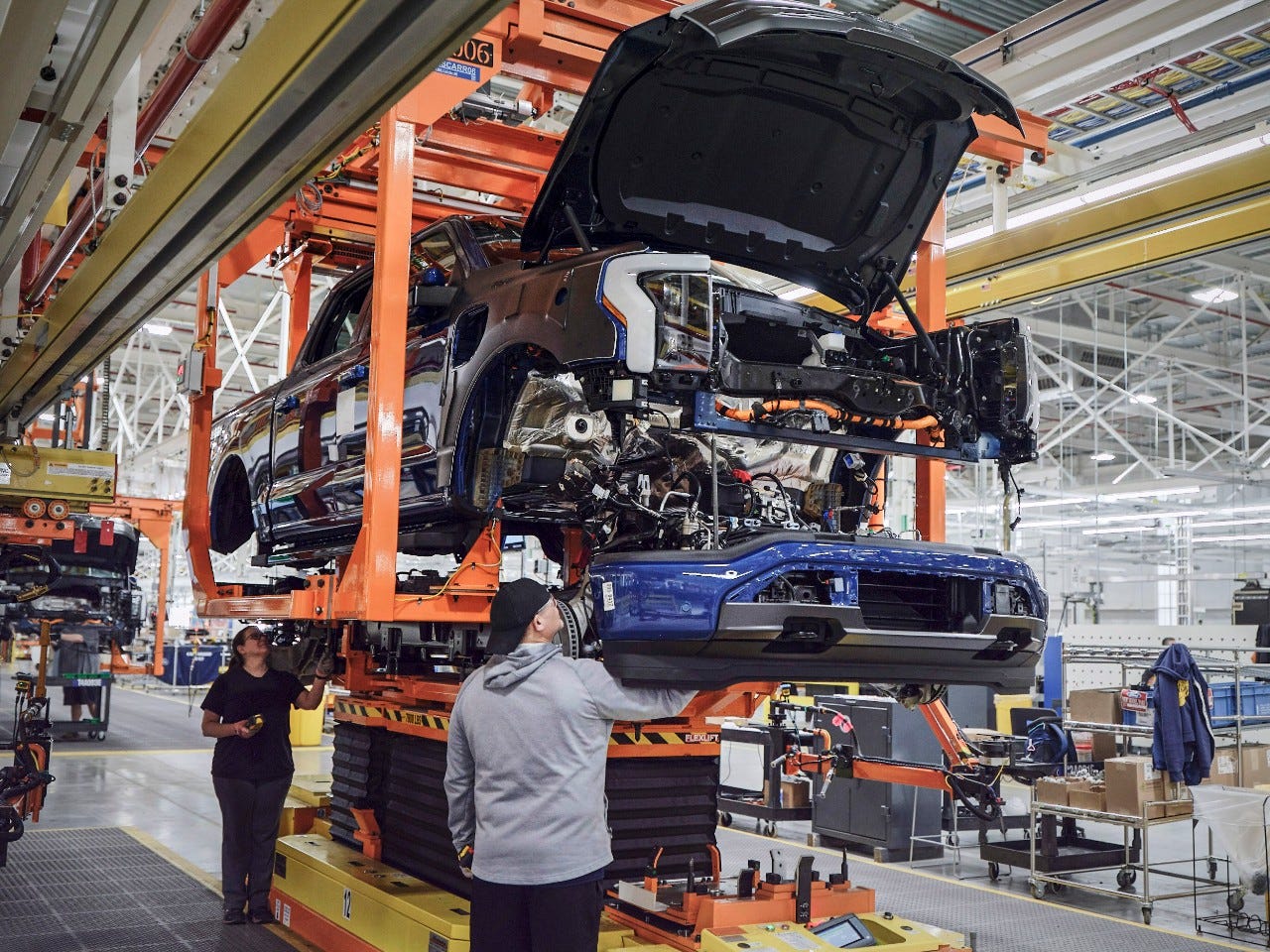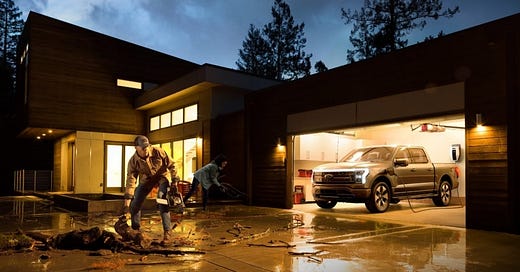
We are in a decade of Transportation Transformation. That's what Full Throttle explores. The newsletter will be delivered twice a week for free once you subscribe here. Follow me on Twitter, Instagram, and Linkedin.
There have been a lot of comments on the Full Throttle website that Electric Vehicles (EVs) are too expensive. The top executives in the auto industry agree with you. There is a push to create an affordable EV and the CEO of Ford just told the world that a “price war” is coming.
“I think this is the biggest, most exciting kind of land grab of revenue in our industry since the Model-T,” said Jim Farley at the Bernstein annual economic conference.

Ford CEO Jim Farley at the F-150 Electric launch celebration in April 2022. (Credit: Ford)
EV RACE
Farley says there will be a race to put an EV in every garage. “Our industry is definitely heading to a huge price war. You're going to start to see democratized EVs,” he said. Farley said Tesla is talking about a $25,000 EV that could cost the company about $18,000 to produce. He plans to make Ford a player.
Ford CEO Jim Farley says a price war will be coming the EV market. (Credit: Bernstein/Aiera)
Others have talked about affordable EVs. General Motors and Honda are joining forces to figure out how to save money and produce an EV under $30,000. On the way to affordable vehicles, Farley says the entire industry will have to change and not all players will survive.
The Ford CEO, who spent 17 years at Toyota before joining Ford in 2007, says software is the future of the auto industry. “It's not motors and gearboxes. It's gateway modules, and software that controls vehicle,” that he says will be most important. This will radically change the way carmakers make money too.

(Credit: Ford)
Ford’s not just selling the car. It is selling the software updates. This software can improve energy management and battery life, as well as provide predictive failure. It’s known as integrated systems telematics and Farley says customers will pay for it.
CHANGING THE RIDE
“We're about to change the ride just like Apple and all the smartphone companies changed the call. And I believe when that happens, when you can ship a lot of software to their car, and you have great sensors, really change that experience to be a lot more productive, there will be a large revenue expansion,” he told interviewer Toni Sacconaghi of Bernstein.
Farley declared that without the software-centered service it will be difficult for EV companies to differentiate their vehicles. “You better have a very integrated, directed software, customer-facing software plus physical experience that will differentiate you in a long-lasting way or else it will be a commodity,” he said.
Farley says value for car EV companies will come from upgrades to software that controls the vehicles systems. (Credit: Bernstein/Aiera)
Sound radical for a CEO of a legacy car company? “We’ve got to break the paradigm, put the pressure on the differentiation be, you know, gearbox and motors and software and experience,” he said, adding, “You buy Ford Model e, and after a year, we're going to give you a complete detail of the vehicle, check all your software is up-to-date, you get a complete birthday for your vehicle.”
PARADIGM SHIFT
To accomplish all this, Farley will need to dramatically change the company that Henry Ford made famous. Already he has split Ford in two. Ford-E will be the EV division and Ford Blue will continue to make internal combustion engine vehicles. That is just the beginning.
Ford video announcement in March 2022 about the plan to split the automaker into two companies. (Credit: Ford)
Farley has been struck by the success of Tesla and believes the startup has provided lessons. Ford will have to change its distribution model, he says. That is the century-old dealer network. “We got to go to non-negotiated price. We've got to go to a 100% online, the vehicle there is no inventory, goes directly to the customer. One hundred percent remote pickup and delivery,” he said.
WHAT ABOUT THE DEALERS?
Dealers will still have a role to play, Farley says, but it will be much more customer service. In addition, Farley plans to cut the advertising budget for EVs (current ad cost is $600/vehicle overall for Ford). Assembly lines will be simplified with fewer work stations.

Ford's Rogue Electric vehicle assembly center in Dearborn, Michigan. (Credit: Ford)
Two important design changes will be coming too. The battery chemistry will be changed to eliminate some of the expensive metals. The aerodynamics of the vehicles, even trucks, will need to be improved to allow for smaller batteries that cost less.
Farley says much of this will be achieved in the second generation of EVs. That’s when the price war hits. He says, “This is going to be a game changer for the second-generation products.”
(Cover image credit: Ford)




